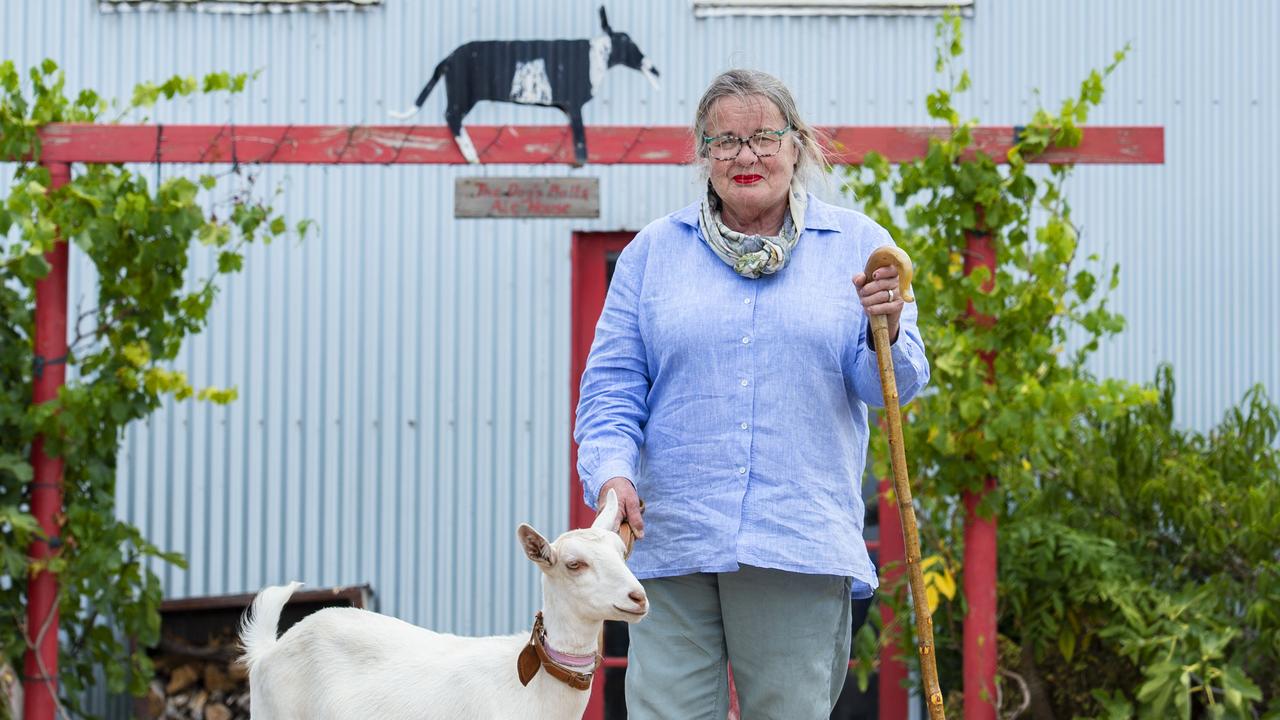Shedshaker Brewing in Castlemaine welcoming back live music in August
The beer is flowing at Shedshaker Brewing, and now another very special element for the business is about to make a comeback after the virus lockdowns.
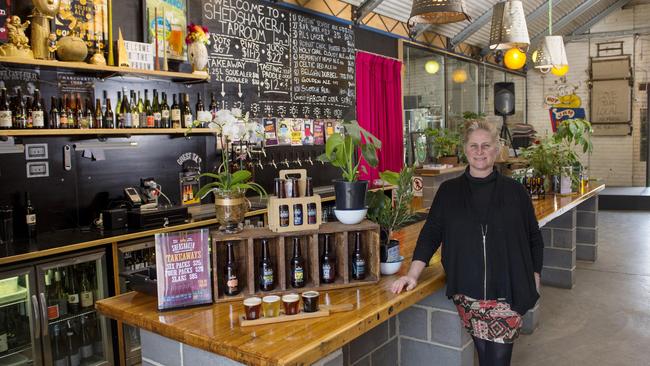
THE beer never stopped flowing at Castlemaine’s Shedshaker Brewing, but the fact the music stopped has been a cause for sorrow for its owners.
While its venue, the Taproom, closed to the public in March, behind closed doors the brewing continued, and delivering beer and pizza became the norm. When restrictions eased at the start of winter, the Taproom reopened, albeit under strict new regulations.
But it’s the return of live music this week — in front of a limited, seated crowd — that has owner Jacqueline Brodie-Hanns excited.
“It’s like a family member has been missing and we are finally being reunited. It is incredibly important to our culture and the identity of the business,” she says.
She says these “Love Your Local” performances, which will run throughout August, are not just a way to welcome back artists after the Taproom — located within The Mill Castlemaine precinct — closed in March in the first lockdown.
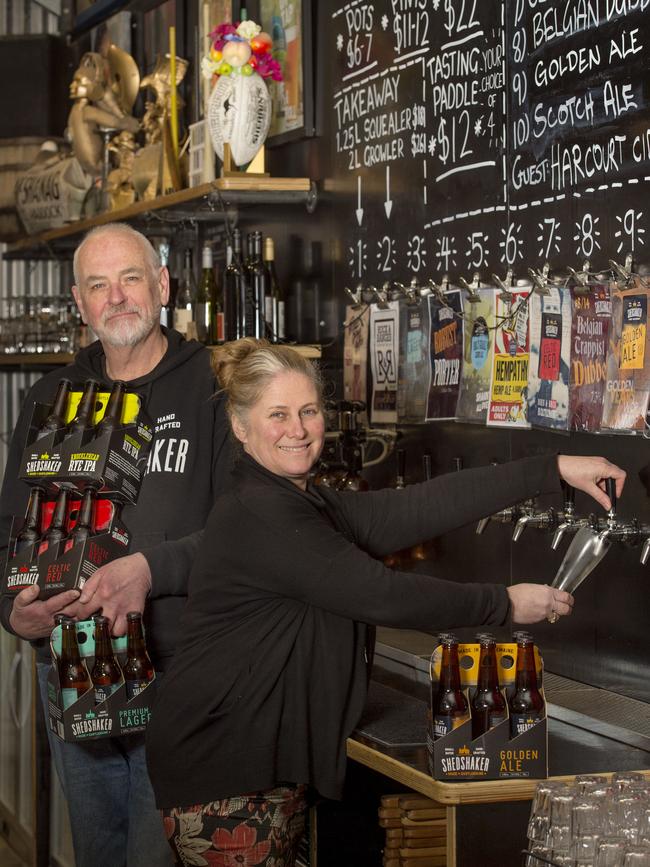
“We do attract and regularly book artists from Melbourne, and indeed people touring, but this first month is all about thanking and acknowledging the local community and the amazing musicians that are in our community,” Jacqueline says. “We wouldn’t have got through the last few turbulent months if it wasn’t for the support of our locals, so we want to give back to the locals as well.”
Shedshaker Brewing began with its three founders — Jacqueline, her partner Doug Falconer, the drummer for Hunters and Collectors, and artist Michael Wolfe — wanting to bring brewing back to Castlemaine.
Michael had a family history of backyard brewing, which would eventually provide the name “Shedshaker”. (Initially they called themselves Castlemaine Brewing, but that attracted a cease and desist from Lion, which owns XXXX brewer Castlemaine Perkins).
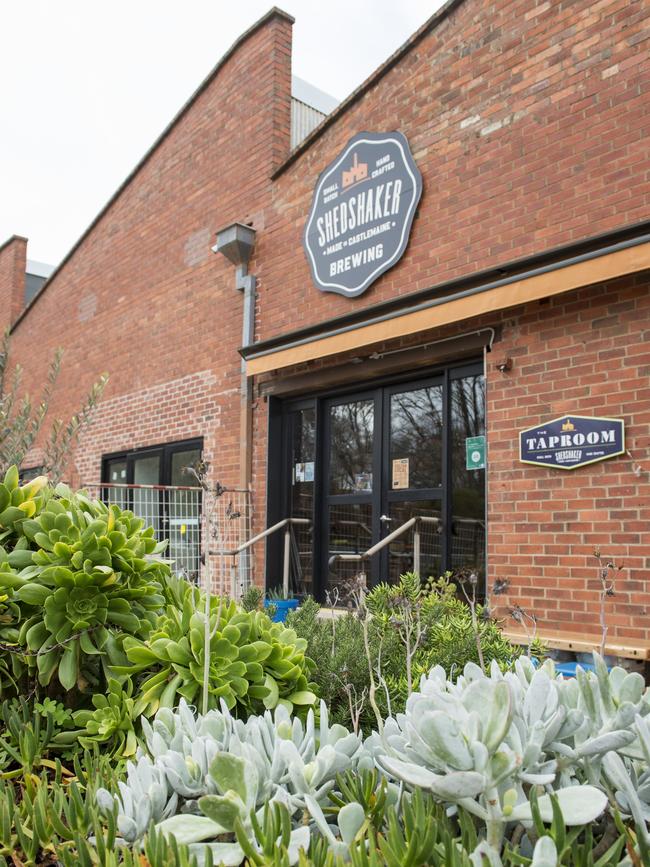
After initially brewing off-site, it moved into the historic precinct, a 19th-century woollen mill, in 2016.
The brewery, with Jacqueline and Doug now at the reins, produces about a dozen beers, while the space is (in normal times) used for events such as live music, literary and political events and discussions, and exhibition space.
“We really do see it as a community meeting place … you’re not coming there just because you are drinking. You are coming there because there is great music on; there is an interesting speaker; because of the food.”
Of their beers, Jacqueline, whose background is community engagement and event management, says her favourite beer is the pale ale, which she says is fruity, with a “great hops balance”. It also has a nod to some personal history — it was named Frailty Pale Ale in honour of the 30th anniversary of the release of Hunters and Collectors’ Human Frailty album. (They also make a Holy Grail cloudy ale).
“We really wanted to reinterpret classics. We didn’t want to do anything that was wacky for the sake of it … we wanted to look at what works, and what works all around the globe … and just give some of the old classics modern twists.”
They have also experimented with their beers through collaborations with local producers. There is an espresso black lager, based on a German dark lager but using coffee supplied by their neighbours at The Mill, Coffee Basics. And after being commissioned by the CSIRO for the inaugural Australian Hemp conference, they worked with Kyneton’s Bunjil farm for an ale christened Hempathy.
Coronavirus has changed many aspects of the business. While they were able to continue to make the beer itself, the way it has been consumed changed dramatically, with the loss of 90 per cent of the wholesale customers.
Jacqueline said they started attending farmers’ markets to generate income, which she says has helped the business connect further with the community.
And instead of selling kegs, most of their production is now bottled or packed forms. That comes at a cost — Jacqueline says where it takes one person one hour to produce six
50-litre kegs of beer, it takes about six hours and four or five people to produce the equivalent in bottles.
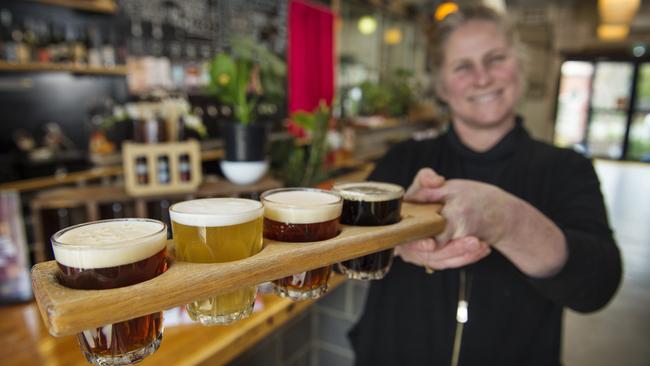
“But we’ve probably tripled our output of packaged product. Certainly June was the biggest trade in the Taproom we’ve had in four years and that was quite extraordinary given how many restrictions and regulations we had to comply with,” she says.
“It was very challenging on a number of levels. You still can’t come and order at the bar, we’re still required to give full table service, which is a very different model to what we’re used to.”
When live music returns on Sunday – as well as Fridays thereafter — it will still not be as people would normally experience it. They will only be allowed to have 20 people in each of three designated areas, and no dancing allowed.
“The idea is to minimise movement amongst patrons so they have to remain seated — a couple of our bands have very loyal followers who love dancing so we have to keep everyone seated,” she says.
“Because we know there is a lot of support for live music but we can only have 20 people in the room, we will be broadcasting outside so we have external beer gardens, as well as live-streaming it online.
“We’re trying to increase the exposure for the bands and for their followers as far as we can.”
While the virus has meant they have focused on their local buyers, a new craft beer export company recently shipped 50 cartons of their beer to Singapore, and Jacqueline said it was well-received and more is being shipped.
Jacqueline is hoping other positive changes will come out of this year.
“I do think there is going to be some really good and positive things that will come out of this pandemic … we’ve all made so many sacrifices that if there can’t be good changes within our society at the end of this, you have to ask yourself what was it all about? And I think that supporting local and being connected to your local community if nothing else, that is going to be a really positive thing that will come out of this.”
MORE

